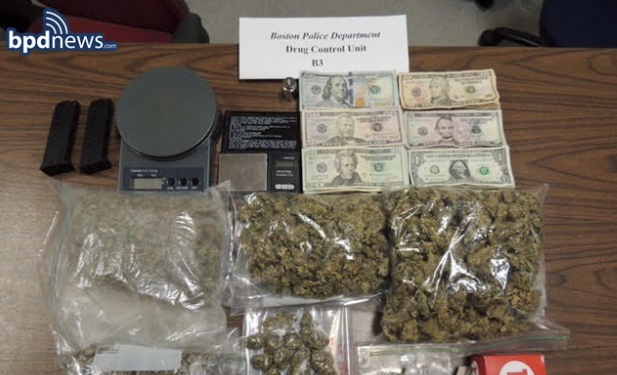Groups cite massive racial disparities in arrest numbers, extremely damning data from past three years
A whirlwind of progressive legislation around psychedelics and other controlled substances is sweeping through Massachusetts, but Boston—where people of color constitute 75% of drug-related arrests—remains slow on the uptake.
Black people represent 56% of Boston’s drug-related arrests, despite making up around a quarter of the city’s population. They also represent 48% of possession arrests. (One stakeholder who analyzed the city’s numbers noted, “The way this data is reported in the public records request understates the number of drug possession arrests because it only lists the main offense for which a person was apprehended—like trespassing.”)
This data—obtained and analyzed by the advocacy group Bay Staters for Natural Medicine—encompasses arrests related to all five classes of drugs between January 2018 to May 2021.
In an interview with DigBoston, Bay Staters volunteer James Davis pointed to a potential solution from across the country. He cited an August 2020 report from the Oregon Criminal Justice Commission, which estimated that Pacific Northwest state’s Drug Addiction Treatment and Recovery Act— which promoted “a health approach to drug addiction by removing criminal penalties for low-level drug possession”—would reduce racial disparities in drug arrests by nearly 95%.
Bay Staters hopes ending possession arrests can achieve a similar effect in Massachusetts. Lately, the group has been focused on Boston, encouraging city councilors to sponsor a resolution on drug decriminalization analogous to those it helped push through in Somerville, Cambridge, and Northampton earlier this calendar year.
The proposed legislation centers the decriminalization of psychedelics, which can be used to treat depression, PTSD, anxiety, addiction, and more. The drafted resolution also tackles the war on drugs at large, deeming the possession of all controlled substances—even those without therapeutic potential—the city’s lowest law enforcement priority.
Davis said Bay Staters secured meeting slots over this past winter with staffers representing Boston city councilors Kenzie Bok, Andrea Campbell, Julia Mejia, and Michelle Wu. The group also got time with Councilor Michael Flaherty himself last summer.
More recently, Davis added, Bay Staters and its ally Massachusetts Recreational Consumer Council organized more than 400 emails and 100 phone calls to Boston’s councilors from constituents. But despite such efforts, no Boston councilors have publicly presented their positions on decriminalization.
Groundwork
I contacted the representatives that met with Bay Staters to ask if they would sponsor or support a resolution decriminalizing psychedelics and other controlled substances. Bok and Campbell’s offices did not reply to multiple inquiries, while spokespeople for Wu and Mejia declined to comment.
A spokesperson for Flaherty, meanwhile, confirmed that the councilor extended a “courtesy meeting” to Bay Staters but would not spearhead a resolution on the matter. The spokesperson declined to comment on whether Flaherty would support a resolution coming from one of his fellow councilors.
“We are very grateful that council members like Councilor Flaherty and other councilors’ teams have met with their constituents to discuss how access to plant medicines could help first responders, veterans, and ordinary people treat their PTSD and addictions,” Davis said. “It speaks very well of them that they have taken an interest in a fundamental policy question of our time.”
“Mayoral and city council candidates have many critical issues on their plate in the thick of a campaign,” he continued.
Campbell and Wu announced their candidacies for mayor in September. Councilor Anissa George joined the race in January, and Councilor Kim Janey —who became the current acting mayor in March—jumped in this April. The mayoral race will culminate in a vote on Nov. 2, which is also election day for the remaining councilors who wish to keep their seats. Bay Staters reached out to Janey about her stance on decrimination, and she did not reply to them—nor to an inquiry for this article.
“As city candidates talk about mental health, racial justice, and methadone mile, decriminalizing life-saving psychedelic plants and ending punitive possession arrests are fundamental solutions they should embrace,” Davis continued. “We are confident the council will do the right thing by the people of Boston later this summer: treating drugs as an issue of public health not criminality and affirming the freedom of adults to choose life-saving plant medicines for themselves.”
Saskia VannJames—director of communications at the Massachusetts Recreational Consumer Council, whose mission is to “decolonize weed and restore communities”—is less confident about such a speedy timeline.
“I think it’s gonna take a while,” she said, explaining that decriminalization requires an entire rethinking of the city budget: namely, a shift from investing in police to investing in services. VannJames cited the “Boston People’s Budget,” a proposal framework asking for an investment of services, specifically by taking $120million from police budgets and allocating that towards “safety and wellness programming.”
“It’s important for the city to listen to its constituents,” VannJames said. “And right now its constituents are insisting that it invest in services—not in police. … We need our municipal leaders to be listening to the healers within their community and to their constituents that are screaming for systemic change.”
Local advocate Carrie Richgels—who works at a Boston health center—said that even if the resolution doesn’t get passed this summer, activists should still do “everything that we can so that when the political will is there, the groundwork has already been laid.”
“Just because it’s not going to happen tomorrow doesn’t mean we shouldn’t be pushing the issue, having the conversations, getting candidates to talk about it, getting candidates to take a stand and make a statement,” she said. “This is a challenge that advocates are showing up for.”
Richgels added that she hopes decriminalization can still become a subject of discourse in the mayor’s race: “We have a huge opportunity. … We have a lot of progressive candidates in the mayor’s race that I think would take this issue seriously.”
Widening Window
VannJames said they are concerned that public discourse on decriminalization has become stagnant.
“People are celebrating cannabis, ‘It’s 4/20, we can smoke.’ And there is an unwillingness to continue to do the justice work,” she said, noting that Black people are — on average — four times more likely to be arrested for cannabis possession than white people in Massachusetts. That figure has only risen since the drug was decriminalized in 2008. (There is a significant range across the state; in one municipality, Franklin, Black people are more than 100 times more likely to be arrested than white people for cannabis possession.)
“There’s really been an unwillingness to acknowledge that the war on drugs brought more charges than just cannabis arrests,” VannJames continued. “It’s a very, very narrow window that has to widen.”
Key to widening that window is education, she said. Anti-racism education is especially crucial to combat the “decades of propaganda” that have ingrained racist attitudes towards addiction and drug use.
“Public conversation is imperative. Public education is imperative. Equity alone is not going to solve the war on drugs,” VannJames said. “We’re a state that has over 100 colleges. Funding consumer education should be a no-brainer.”
“[We need] the community to uplift the voices of the most marginalized people who have been directly impacted—people who have gone to jail, dealt with substance abuse, dealt with mistreatment, had drugs planted on them,” they continued.
According to VannJames, healing the communities devastated by the war on drugs requires—in part—that the public learns to see addiction as a public health issue rather than a criminal one.
Richgels explained that the stigma attending criminalization discourages individuals struggling with addiction from seeking treatment or emergency medical care.
“There’s definitely a lot of hesitation and fear,” she said. “Removing that barrier is just going to get people that much closer to becoming engaged in their own health and in their own recovery, if that’s what they’re seeking.”
When it comes to preventing overdoses and saving lives, Richgels said “the state—and the city of Boston specifically—needs to use every tool in their toolbox.” One of those tools is the proposed resolution on decriminalization.
“It’s obvious at this point that the war on drugs is a failure, and it has disproportionately negatively impacted communities of color and Black communities,” Richgels continued. “[The resolution] is a step towards making that right.”
“Whenever we have these conversations around harm reduction and decriminalization, we need to acknowledge the damage done,” Richgels added. “In addition to the decriminalization efforts, we need to invest in reparations for communities who have suffered the majority of the burden in the war on drugs in the last four decades.”
This article was written in collaboration with the Boston Institute for Nonprofit Journalism.
Juliet is a college student studying philosophy at Harvard. Her writing & reporting appear in STAT News, the Harvard Crimson, the Harvard Advocate, and the Harvard Political Review.


